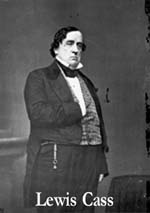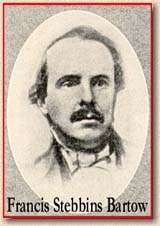 |
Bartow County was created from a portion of the Cherokee County by an Act of the Georgia Legislature on December 2, 1832, and was first called Cass County in honor of General Lewis Cass. Cass, an American statesman born in Exeter, New Hampshire in 1782, and was educated at Phillips Exeter Academy. He was elected to the Ohio legislature in 1806. When the War of 1812 broke out, he entered the U. S. Army and rose rapidly to the rank of Brigadier General. From 1813 to 1831, he was the second territorial governor of the Michigan Territory. He steered Michigan to statehood and designed the state's Coat of Arms. President Andrew Jackson appointed him Secretary of War in 1831 and later minister to France. In 1848 he was the Democratic candidate for president, but lost to Zachary Talor. Later, he became President James Buchanan's Secretary of State, but resigned when Buchannan refused to respond decisively to South Carolina's secession and his refusal to reinforce Fort Sumter in Charleston, South Carolina.
In 1833, the town of Cassville was laid out and made the county seat. By 1849, Cassville had a brick courthouse, three churches, seven stores, two hotels, and two colleges. The Cassville Female College and the Cherokee Baptist College.
The views of General Cass on slavery caused revulsion of feelings and the people of Cass County felt their county should be re-named after a Confederate hero. On December 8, 1861 the county changed the name from Cass to Bartow in honor of the gallant Francis S. Bartow, who perished at the head of his regiment in the opening battle of the Civil War, the Battle of Manassas. At the same time an effort was made to change the name of Cassville to Manassas without success.
Francis Stebbins Bartow was born September 6, 1816 in Savannah, Chatham County, Georgia to a distinguished Georgia family. He was a graduate of Yale Law School and became a planter and slave owner. Bartow, a strong supporter of secession, was a delegate to the Georgia Secession Convention. His fervent secessionist stand led to his appointment to the Provisional Confederate Congress, and he served on the Flag and Seal, Engrossment and Military Affairs Committees, as well as serving as chairman of the Military Affairs Committee. Bartow became a captain in the Oglethorpe Light Infantry, a home-guard unit in which the sons of Savannah's leading families served. When the Confederate Congress voted to forbid people from holding both political and military office, Bartow chose to remain in the military and give up his political position. The Oglethorpe Light Infantry was transferred to the 8th Georgia Infantry and Bartow was elected Colonel of this infantry on June 1, 1861 and Brigadier General P. A. C. S., prior to his death. Bartow and his troops headed to the Shenandoah Valley to take part in the Battle of Manassas. Only half of his troops, however, were able to arrive in time to fight. Bartow himself took the forward position, leading his troops in a charge down Henry Hill. There he was mortally wounded, and was reported to have said as his last words, "They have killed me boys, but never give up the field." A few minutes later, on July 21, 1861, Bartow died. There is a Historical Marker for Francis S. Bartow at the Manassas National Battlefield Park in Manassas, Prince William County, Virginia
After the destruction of Cassville by the forces of General Sherman in 1864 the county seat was changed to Cartersville, then a small, thriving town on the Etowah River. Cartersville was named for Farish Carter, Esq., perhaps the wealthiest land owner in the State during the ante-bellum period. The town was incorporated by an Act of Legislature approved February 5, 1850.
...Courtesy of
Wihuna Joyner
Interesting facts about Bartow County include:
Site of the Etowah Indian Mounds State Park
Site of Georgia's first Supreme Court Decision in 1846
Birthplace of Cherokee Stand Watie in 1806
Southern most point of the Appalachian Mountains
Home of Rebecca Latimore Felton, first woman named U. S. Senator, 1922
Site of the World's first outdoor Coca-Cola advertisement, 1894
Home of the 40,000 acre Etowah Valley Historical District
Site of the last Confederate parole east of the Mississippi, May 1865
Birthplace of the Confederate Memorial Day, the forerunner of Memorial Day
Site of Georgia's oldest covered bridge, Euharlee/Lowery Bridge, 1886
Home of such notables as: Humorist Bill Arp, Author Corra Harris, Gangster Pretty Boy Floyd, Evangelist Sam Jones, Baseball great Rudy York, Georgia Governor Joe Frank Harris, and Judge Robert Benham, the first black Georgia Supreme Court Justice.


| GO TO: Text Site Map | ||
|
©2002 - 2024 Bartow History Museum
Last modified: July 12, 2008